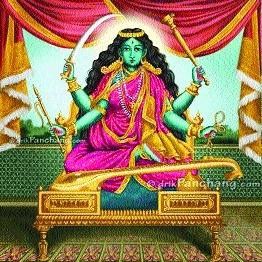Matangi - Utterance of the Divine Word
| Date :03-Apr-2020 |

By Rajendra Diwe :
Maa Matangi Devi is the ninth Mahavidya among the Dasha Mahavidya. According to Devi Purana, Maa Matangi has dark complexion and yet is lavishly elegant and beauty with very refined beautiful features. Devi Matangi resembles Devi Sarasvati in appearance especially, the way she holds the divine musical instrument Veena. But there is significant difference in these two forms. Ma Saraswati grace is centered on more of ‘Saatvik’ form of learning such as fine arts, academics, mastery in language learning. Maa Matangi is the ‘Tantric form of Maa Saraswati’.
Maa Matangi’s sadhana helps in acquiring supernatural powers using ‘Tantric Prayog’ such as controlling people by influencing their minds, freezing thoughts. Matangi Devi also holds Japa Mala, Lotus, Parrots, Shankh and Chakra. All these together symbolize the interrelated aspects of sound, knowledge, and power. Sound of the Veena represents creativity; parrot that accompanies Matangi associates with speech, Japa mala represents sound in the form of power of chanting Mantra. Combined power of all of these forms the power of Knowledge and knowledge is power. This is applicable to all aspects, skills relating to any field of learning.
The more we know, the more knowledgeable we are, the stronger will be our hold on mastering that subject or skill. Maa Matangi is also popularly known as ‘Ucchishta Chandalini or Ucchishta Matangini’. Devi Matangi is the repository of all 64 forms of art (Chatur Shashti Kalas). She is the one who bestows us with listening, speech, perception, learning, logical analytical skills, reasoning, and such other important learning factors. According to scripture Dasha Mahavidya, “Matangi is a word derived from two Sanskrit words ‘Mata’ and ‘Angi’ which means ‘a thought’ or ‘an opinion.’ Matangi is thus the Goddess power which has entered into thought or the mind.
She is the word as the embodiment of thought. She also relates to the ear and our ability to listen, which is the origin of true understanding that forms powerful thoughts. Matangi bestows knowledge, talent and expertise. She is the Goddess of the spoken word and of any outward articulation of inner knowledge, including all forms of art, music and dance. Matangi relates to Saraswati, the Goddess of wisdom and the consort of Lord Brahma, the creator of the universe. Matangi, like Saraswati, plays a Veena and rules over music or audible sound in general, not just the spoken word. She is the manifest form of song. Like Saraswati she is symbolized by the rain cloud and by the thunder, as well as by the rivers pouring into the sea. She is the vibratory sound, Nada that flows in the subtle channels, Nadis, down through our entire body and mind.”
According to the Upanishads the essence of the human being is speech. What we express through speech is the final product of all that we take into ourselves in life. This ultimate residue and representation of who we are through speech is Matangi. This, however, is not ordinary or casual speech, but the deepest expression of our hearts. The Divine Word has power, feeling, and passion, which is not mere human emotion but Divine bliss. The Divine Word is not merely a theoretical or practical statement but an effusion of energy and delight. This joy is another aspect of Matangi.
Matangi is thus a wild, playful and ecstatic Goddess. David Frawley highlights, “Matangi represents the ministerial power of the Goddess. She is the counselor to Rajarajeshvari or Tripura Sundari, the Supreme Queen of the universe. As such she is called Mantrini and has power over all mantras, particularly in their vocalisation and articulation. She gives us the ability to communicate with all the other Gods and Goddesses through the power of the mantra. In fact she rules over all forms of knowledge, counseling and teaching.” Worshipping Matangi will help devotees to get attractive and magnetic personality, sound articulation, and mastery over knowledge and skills.
They can also influence others and gain control over enemies. Her blessings can offer protection against many impediments like, negative energies, marital discord, poor studies and career, memory loss, stammering and Sun’s malefic effects. David Kinsley in his book ‘Tantric Visions of the Divine Feminine’ mentions, “Earliest traces of Matangi arise in the story from the Divyavadana, a Buddhist collection of stories. There is a story of a low caste girl, whose father-in-law is said to be the king of elephants. There are parallels to Matangi’s power to attract and control, as well as distinct ties to nature. All these are important to Matangi as a goddess; however, they merely show hints of her characteristics, not a story of the goddess herself.
All in all, this paints a picture for the beginnings of this tantric goddess, with many more origin stories to follow. Matangi has several different forms throughout various Hindu texts. Most often, she is a beautiful girl with a dark or black complexion. She has beautiful long hair, elements of nature around her, and intoxicating eyes.” David G White in his research book Tantra in Practise published by Motilal Banarasidass Publishers writes, “Matangi can also be associated with the forest and nature. Many scholars say that Matangi is the goddess of the hunter tribes. Matangi is called “She Who Lives in the Forest, Who Walks the Forest, Who Knows the Forest, Who Enjoys the Forest, and Savari”. Furthermore, Matangi is often said to be the daughter of Matanga, who was most likely a hunter, giving her true lineage to nature. Matangi, as a goddess of the hunter tribes, gives this tantric goddess power over living things residing within nature.”
